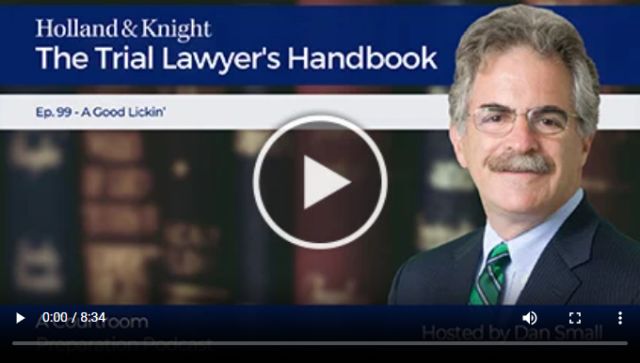In this episode of "The Trial Lawyer's Handbook" podcast series, litigation attorney Dan Small reflects on the wisdom of juries demonstrated in the complex drug smuggling Racketeer Influenced and Corrupt Organizations Act (RICO) case in Appling County, Georgia. He recounts the dramatic trial of Larry Jackson and his family, who were charged with money laundering and tax evasion. A key moment came when AZ Jackson, Larry's father, took the stand with a seemingly implausible story denying involvement despite overwhelming evidence supporting the opposite. Mr. Small's intense cross-examination exposed the truth, helping the jury deliver a verdict convicting all defendants – notably except AZ – on tax charges. Mr. Small's post-trial conversations with jurors about AZ gave him an opportunity to reflect on the profound insights they can bring, reminding lawyers how important it is to present clear, compelling cases while also focusing on what truly matters.
Listen to more episodes of The Trial Lawyer's Handbook here.
Mr. Small is also the author of the American Bar Association (ABA) book Lessons Learned from a Life on Trial: Landmark Cases from a Veteran Litigator and What They Can Teach Trial Lawyers.
Podcast Transcript
Dan Small: The wisdom of juries. I know, I know, it's popular to bash them. And after all, they are only human and therefore capable of making mistakes. But I have also seen them show real wisdom. Sometimes we lawyers get caught up in our cases and lose sight of what's at stake. It can take a jury to remind us what's at stake [and] what's important.
In the drugs and corruption RICO case in Appling County, Georgia, that we've been discussing in the past several episodes, Larry Jackson was the kingpin of the drug operation. Larry Jackson's father, AZ Jackson, had grown up a dirt-poor farmer in Appling County and remained poor all his life until his son Larry started making big money in the drug business. Larry then used his father to help launder his illegal profits. For example, Larry and his wife wanted to buy a house. They did all the looking, asked all the questions and did all the negotiations. They set the closing price and the closing date. But then at closing, AZ was the only one who showed up with a shopping bag full of cash and bought the house in his name. They repeated this process with cars and all kinds of other major purchases. Larry and his wife would essentially make the purchase, but AZ would show up with a shopping bag of cash.
We brought the IRS in, and they could find no real legitimate assets or income for AZ. They scoured the county and found various cash purchases. The house was the biggest and most dramatic. So, we indicted father and son on tax charges, in addition to the other charges against Larry.
Did we care about AZ? Not much. The tax charges were a way of highlighting the laundering of cash and also enlisting the IRS' help in doing that. Would we have dropped the charges against AZ for a deal with Larry? Probably. But we never had to make that choice. Larry insisted on going to trial, so AZ went with him. Three Jacksons: father, son and Larry's wife Suzette, who was also the bookkeeper for the drug operation, were now among the co-defendants.
At the end of the government's case, there was little or nothing that Larry could really do. He couldn't take the stand in face of the devastating tapes with his voice on them. None of the defendants could, except AZ, against whom there were no tapes, just shopping bags full of cash. Lots of it. Did he think the jury would believe him? Did he just feel that as a father he had to do what he could to defend the family? It's hard to say.
AZ Jackson took the stand and told a story that even on his own lawyers' direct examination, his own lawyers' questions, was clearly ridiculous. He said that he knew nothing about the drugs. He had done odd jobs over the years to make money so that he could one day buy his son a house and other nice things, he kept the money under his mattress in his little shack and so on. It was clearly nonsense. When it was over, I started to get up for cross-examination. My wise and wonderful partner at trial, Assistant U.S. Attorney Fred Kramer, grabbed my sleeve and whispered, "Dan, go easy on the old man. Who cares?"
So I did. I did at first. But the story was so bad, he was so unprepared for cross, and he was such a bad liar, that with each question, the story just got worse. I gradually got angry and started digging in. By the end of an hour or two of cross-examination, through no particular skill of mine, everyone understood that he was a liar and the story was nonsense. When I went back to our table, I somewhat sheepishly whispered to Fred, "Sorry, I guess I didn't go easy." He smiled and said, "It's OK. He deserved it."
The case was a complex one for the jury: 11 defendants, several different counts under several different statutes and a variety of RICO legal issues raised by the defense. So when the jury went out to deliberate, we expected them to be out for some time. As a result, we were very worried when, after only about four hours, we got a call to come back to the courtroom: The jury had a question.
When court reconvened, the judge asked the Marshall to take the written question from the jury foreman and bring it up to the bench. The Marshall handed it to the judge, the judge unfolded it, read it to himself, and then looked up at me, clearly trying to suppress a smile, and called all counsel up to the sidebar. "The jury's note reads as follows," he said. "On count seven, the tax charge, can we convict Larry Jackson and let the old man go?" The judge looked up at me and asked, "Mr. Small?" Now it was my turn to try to suppress a smile.
The legal answer to the jury's question was easy. Yes, of course, the jury could separate the defendants. But everyone at the sidebar realized the broader implications of the question. If the jury, after only four hours, was focused on count seven, that probably meant they had already dealt with counts one through six, which included the RICO counts. And that was not a good omen for the defense. So, I responded to the judge, "Yes, judge, they can." All parties agreed, the judge gave the Marshall the answer to give back to the jury, and within a couple more hours, the jury came back with its verdict: all defendants guilty on all counts, except AZ Jackson, the father, not guilty on the tax charge, the only charge against him.
In that district at that time, the lawyers could talk to the jurors after the verdict. It was such a great opportunity for trial lawyers to learn. It's too bad too few courts allow it. The jury had a number of helpful comments and insights, but the one that I remember best was on AZ Jackson. "Mr. Small," one of the jurors said, "we assume that our verdict will send the man's son and daughter-in-law to jail for a long time. We talked it over, and we agreed that what that old man needed was a good lickin'! And you gave it to him, and that's probably enough."
Of course, they were right. Don't ever underestimate the collective wisdom of 12 people working hard to try to do the right thing. Respecting that effort emphasizes the challenge of presenting a case to them in ways they can understand and helps guide them towards what's right. I don't know whether I went too far with my cross of AZ Jackson, or just helped the jury reach the right result, or both. I tend to think it's both. But I was satisfied with the result, and it was a fun cross. Lessons learned.
The content of this article is intended to provide a general guide to the subject matter. Specialist advice should be sought about your specific circumstances.


